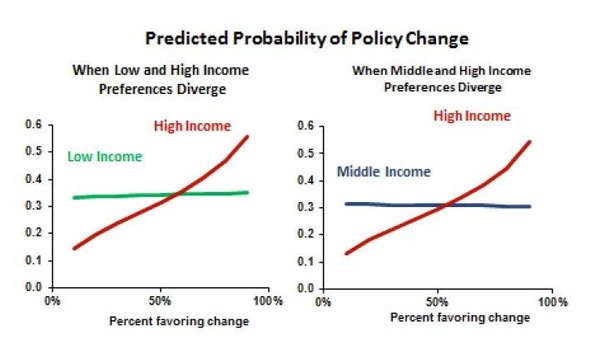One man, one vote is a fundamental tenet of representative democracy. But according to a new book by Princeton politics professor Martin Gilens, poor and lower-income Americans might not have much of a vote at all. In Affluence and Influence: Economic Inequality and Political Power in America, Gilens argues that America's top earners are the only people whose opinions have any influence on policy.
In a blog post at the political science blog The Monkey Cage, he summarized some of his findings with these graphs:

Martin Giles, The Monkey Cage
As you can see, Gilens found that the percentage of middle class or lower-income people who support a particular policy has virtually no bearing on that policy's likelihood of being enacted. However, the more high earners support a policy, the more likely it is to come into effect.
"If federal policy more equally reflected the preferences of all Americans," wrote Gilens, "we would see a more progressive tax structure, higher unemployment benefits, stronger regulation of business and industry, a more protectionist trade regime, more prayer in public life, and less access to abortion."
In an interview with Lean Forward, Gilens said he was "surprised by the extent of the inequality and responsiveness to different income groups—and in particular the lack of influence the middle class has."
There are, he said, certain beneficial circumstances—such as an evenly split Congress—which can increase government's responsiveness to middle class preferences. However, even in those circumstances, "the middle class never do as well as the affluent, and the poor never do as well as the middle class."
When asked why the wealthy wield such outsized influence, Gilens was unequivocal. "The most important cause seems to be the role of money in politics," he said. "Campaign contributions, donations to parties and political organizations, contributions to lobbying organizations and so on." The Citizens United decision and super PAC spending, he added, "are the latest development in a decades long increase in the cost of running for office."
"The cost puts a tremendous burden on officeholders and office seekers," he said, "and makes the raising of money, in comparison to other political resources, all the more important."
The key to ameliorating the problem, he suggested, was campaign finance reform. "I agree with Russ Feingold's emphasis," he said, referring to the former former Wisconsin senator's response to his Boston Review essay on affluence and government.
Though Gilens hesitated to make specific policy recommendations, he said he hoped to conduct future research on how different state-level campaign finance models affect the state government's responsiveness to middle-class and low-income voters.
There is, he suggested, a lot riding on the answer. "We have a conception of what it means to be a democracy," he said. "One person, one vote. The notion that the opportunity to exert one's influence and shape the policies government adopts has to be widespread—even if not exactly equally widespread—if this country is going to be called a democracy."






Another reason to get 'for-profit' out of our economics system. it's killing us.
Oh we're 'the common people,' 'the little people' that the Olympian wealthy look down on. Why should we matter?
Ned, superb reporting on this book. We all, in one way or another, knew that this was obvioulsy true, but, solutions are hard to find, if we do not have reasonable evidence that a problem exists. Martin Gilens fires a volley of reality at the thinking process, and, I certainly hope that his conclusions grab hold in the American mind.
Gaining one man one vote isn;t the key, it's voting the policy not the man. Voting for a "representative" assures that we will not make policy choices, s/he will. And that's not democracy, representative or otherwise. No representative can represent constituents. Their is no reliable way to get each constituent's informed view on a policy and to balance then in a way that gives each side its due. Too many constituents, too many conflicting views. So NO ONE gets their represented except chiefly if it happens to accord with the representative's and his "sense" of what people want.